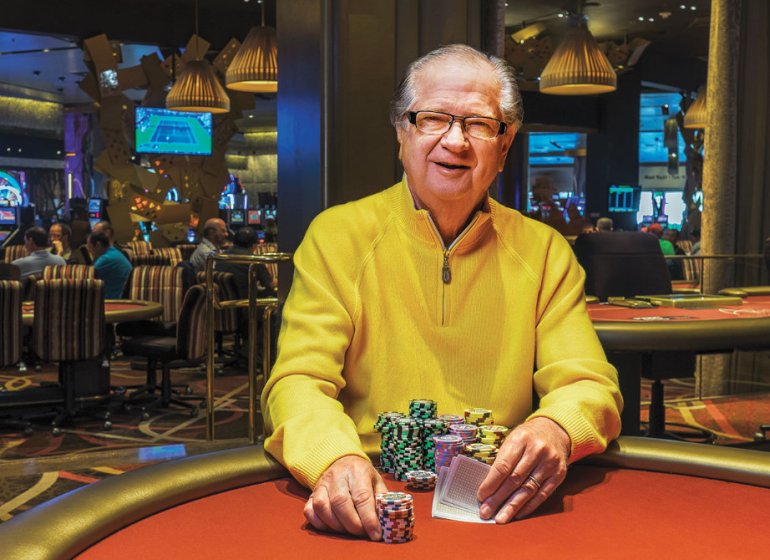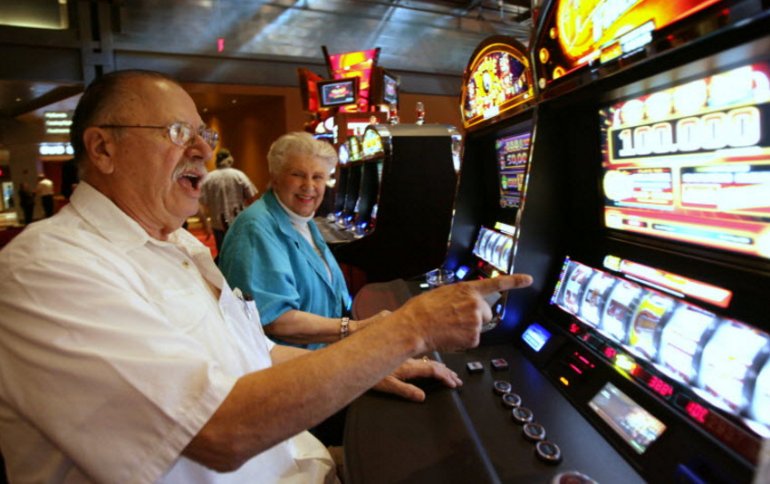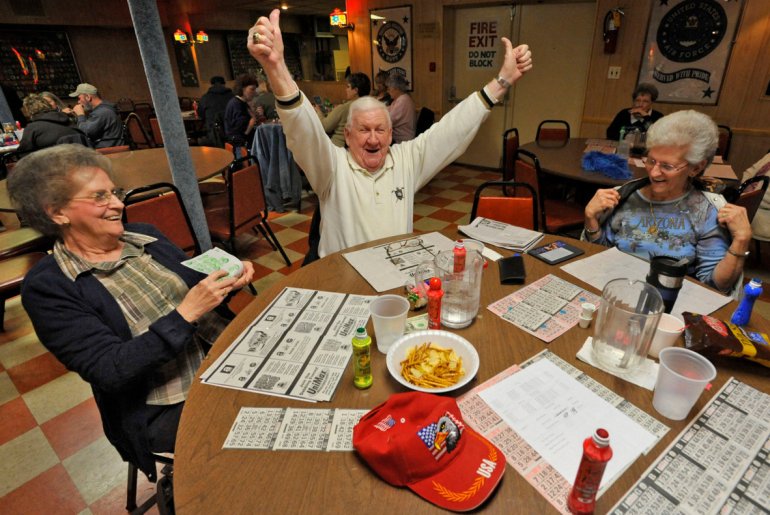
Old age is traditionally associated with wisdom. Parents tell their children, from an early age, "Listen to what the elders say to you," drilling into the minds of offspring the postulate of the unconditional rightness of adults. However, the older you become, the more clearly you understand that elderly people make mistakes and commit stupid acts as often as reckless teenagers.
As an illustrative example, we can pay attention to older adults' hobbies, such as gambling. Look at casinos in Las Vegas. You can notice a lot of gray-haired visitors who are fond of playing video slots or crowded around the craps tables, not to mention bingo halls full of pensioners.
Gambling clubs have never experienced a shortage of older customers. High-ranking police officers, retired army officers, respectable enterprise directors, politicians of different levels, and prosperous business people over sixty are typical casino guests. Some bring their children and grandchildren, turning visiting gambling facilities into family activities.
How dangerous is gambling for seniors? Why do they go to casinos? Are they able to control themselves when gambling? What are the consequences of gambling for them? The answers to these and other questions are in our article below.
Some Statistical Data
Let's start with some thought-provoking statistical data. We want to quote a report from the National Council of Problem Gambling:
Older adults are one of the fastest-growing groups of gamblers. Between 1974 and 1994, the percentage of seniors who "had recently gambled" increased from 20% to 50%. It has been reported that gambling is the most frequently mentioned social activity of people over 65. In the list of priorities, casinos and bingo were ahead of movies, lunches, shopping, and golf. - NCPR
In 2006, the New Jersey Study carried out research that showed unexpected results:
23% of the state's inhabitants over 55 years have signs of problem gambling.
David Oslin, Professor of Psychiatry at the University of Pennsylvania, also provides some interesting data:
In 2005, about 9% of individuals over 65 spent more on gambling than they could afford.
Well, the data are shocking. Many will surely assume this problem concerns only pensioners from developed countries with high citizen incomes. It is believed that the average senior from an emerging country has never visited casinos and can afford to buy several lottery tickets at most once a week.

This statement is partially true, but card games that do not require special equipment and dealers are worth mentioning. We are talking about bridge, canasta, solitaire, and preferans. In addition, modern seniors have mastered the Internet, and they have faced advertisements for online casinos and other types of gambling.
Therefore, do not ignore this problem. Your old relatives may unpleasantly surprise you one day.
Why Do Old People Gamble?
There are many reasons why older adults visit casinos. Let's enumerate the major ones:
- Search for communication: Casinos are often visited by people who have lost their spouses in their declining years or miss their children. Thus, they can communicate with other visitors or staff. This is the main reason for the popularity of bingo halls among seniors, where dozens of people participate in draws.
- Operators' activity: Casinos attract senior citizens by offering free drinks, transfers and coupons, special events, and prizes that appeal to the older generation.
- Escape from problems: Gambling helps older adults forget about incurable diseases, poor health, and other issues they have inevitably faced. Such entertainment allows them to forget imminent death, at least for a while.
- Return to youth: It seems to them that attending casinos or races returns them to their child. They again take risks, commit reckless acts, and feel the adrenaline rush. This is a very tempting feeling similar to that observed after drugs.
- New emotions: Some people discover the world of gambling only after their retirement. They try to make up for lost time and get as many different emotions as possible from life. Do you remember numerous films about older adults entertaining with all their might?
- Improvement of self-esteem: In society, seniors are often treated as helpless people who need help and sympathy. Not all pensioners agree with this attitude toward themselves. They try to prove their independence in different ways. By visiting a casino, they want to show the world that it is too early to dismiss them because they are ready to live and have fun.
- Financial problems: Many senior citizens can no longer assess the probability of winning lotteries, bingo, blackjack, and other games of chance. Gambling seems to be an authentic way for them to get rich. They hope to improve their position or earn money, which they can bequeath to their children and grandchildren.
- Consequences of treatment: Recent studies have demonstrated that gambling can be a side effect of some drugs used to treat Parkinson's and other age-related diseases.
- A lot of free time: Seniors often have few things to do. Having entered a gambling club, they can spend days there if their health allows. The absence of strict time limits contributes to the development of gambling addiction.
It must be admitted that many of the abovementioned explanations for gambling popularity seem pretty reasonable. Why should seniors avoid having fun if this helps them to forget about their problems and enjoy their lives?

The problem is that older adults are more susceptible to gambling addiction, so relatives and friends should look after them and provide assistance if necessary.
Why Is Problem Gambling Dangerous for Old People?
Diminished cognitive abilities do not allow older adults to reveal the initial signs of gambling addiction and notice its presence even at a severe stage of the disease.
They often become too gullible and cannot notice the tricks gambling operators use to attract customers. They treat the professionally friendly attitude of casino employees as the sincere respect they lack in real life.

Non-working pensioners are not able to solve financial problems that arise as a result of problem gambling. Having lost their savings, they are forced into debt and are often embarrassed to tell their children they have difficulties.
Many senior customers take failures too personally. Even moderate losses can increase blood pressure, which can lead to severe consequences.
What Games of Chance Do Seniors Prefer?
According to Harrah's, seniors often play slot machines in the United States and Western European countries. Three out of four respondents admitted that slot machines primarily attracted them. In addition, video poker slots, bingo, and lottery halls are trendy among pensioners.
It is worth noting that preferences differ significantly in various countries and regions. Unfortunately, there is no complete and reliable statistical data on the overall situation in the world.
Then, we offer several true stories of real seniors who have suffered from gambling addiction.
Harmful Inheritance
The retired Albert Pearce from London is somewhat unlucky, although we are not going to waive responsibility from him for his unreasonable attitude towards money and gambling.

He earned his living by washing windows for years and then unexpectedly inherited three hundred thousand British pounds. It is beyond any doubt, it is an impressive amount for the simple worker. His funds were left to Albert by his friend Julie Spalding, who died at the age of ninety-eight.
Money swept Pearce off his feet. He immediately started traveling and regularly attended casinos. Such a way of life inevitably leads to financial problems. It is the same as scooping money out. Well, easy come, easy go. However, it was just the beginning of Albert's troubles.
In 2014, Cecil Bray, an eighty-two-year-old nephew of Julie Spalding, laid claim to the aunt's inheritance. He had cared for the older adult for many years and even left his job. Before her death, they quarreled. She drove him out of the house, starting to keep company with Albert. Considering Bray's arguments, the court found that Pearce should return him three hundred thousand.

But Albert had already spent his entire fortune to the last penny. He kept visiting casinos even during the trial. In August 2017, Pearce was declared bankrupt and sued.
An investigation is being conducted to determine whether he has concealed money. If this is proven, he will be sentenced to jail. However, considering the suspect's age and the deliberation of the British court, he will hardly survive until the committal to prison.
A Secret Hobby of an Old Lady
The story of Elfride Lippa from Victoria, Canada, confirms that it is necessary to visit your old parents as often as possible and help them to solve everyday problems. The son and daughter of a ninety-year-old woman were not attentive enough to their mother. Now, they have to deal with the property seized by the court decision.

Elfride worked her entire life in the service sector as a waitress and then a manager. After her husband died in 1997, she sold the house and moved to the condominium, putting in one hundred thousand Canadian dollars for a rainy day.
It was probably too trivial for her to enjoy the advantages of her age, so she decided to attend the View Royal Casino.
She became so addicted to gambling that she visited the house almost daily. Elfride played even on Christmas Eve, Christmas, and other holidays, which people usually spend with their families. It is not clear where her children were. Later, they were surprised by the fact that her mother had spent holidays.
As a result, Elfride lost money from her bank account, mortgaged twice her real estate, and kept gambling at casinos. Now, she owes a hundred thousand to a bank and forty thousand to a private lender.
Her daughter Sue Yakubovich claims that she and her brother had no idea about the mother's addiction:
As a result of her gambling addiction, my mother lost her savings, home, health, and independence and harmed most of her relatives. She intentionally concealed problems with gambling and succeeded in doing that.
Her daughter found out about the trouble when Elfride was hospitalized. Sue checked her mailbox and was shocked to find unpaid bills, bank notifications, and coupons from the View Royal Casino. When asked why she had attended the casino, the woman replied: "I enjoyed it."
The psychiatric examination found her insane. Tom Lippa believes that financial establishments and casinos used Elfride for their selfish purposes, knowing about her health problems. For example, the bank issued an eighty-five-year-old woman a mortgage for thirty-five years and did not take action when she repeatedly withdrew large amounts of money at ATMs.

It is unclear whether Elfrida's children will sue the bank and the casino. The prospects for such lawsuits are not very promising. Heirs, who got only their mother's debts, only say they are against plans to open another gambling house in Victoria.
Celebrities Also Suffer from Gambling Addiction
David Milch, a TV producer and scriptwriter over seventy years old, also did not escape problem gambling. The winner of the Emmy Award and other prestigious awards, the author of numerous successful television series lost millions of dollars and ran into huge debts.

In his later years, Milch became addicted to horse races. From 2010 to 2011, he spent about twenty-five million dollars on race betting. He still owes lenders over fifteen million dollars. The general public knows about his problems thanks to his ex-wife's statements during the divorce process.
Conclusion
A careless attitude towards gambling punishes both young and old. If you gamble, you should be careful regardless of age.
Having noticed that your old relatives have started visiting casinos, buying lottery tickets, making bets, or just playing cards with friends, you should pay attention to this fact. Perhaps they will need your help.
We invite you to discuss the topic of age-related gambling addiction in the comments. Share your experience, talk about real cases, give advice, and ask questions.














































